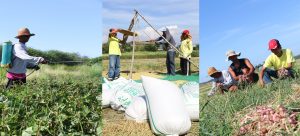
Eighty-six (86) Pantawid Pamilya beneficiaries in Badoc, Ilocos Norte (IN) are typically engaged in conventional farming as their main source of income.
In the past, according to Mr. Rogelio L. Gamponia (President of 4Ps Farmers Sustainable Livelihood Program Association), they usually reap 45 cavans of rice during the first cropping season.
Thus, in order to have a better harvest, the Sustainable Livelihood Program (SLP) of the Department of Social Welfare and Development – Field Office I organized and funded a two-day Skills Training on Production Technologies for Farm Crops in partnership with the Local Government Unit of Badoc, IN and the Mariano Marcos State University in Batac City, IN.
Through the said training, the Pantawid Pamilya beneficiaries acquired knowledge on new farming technologies and proper management of crops that enhanced their existing understanding and capability as farmers resulting to an increase in their farm production by at least 20%.

“Idi, dua a daras kami lang a makamula, nasayaaten nu maka-2nd cropping kami. Tatta ket maka 3rd cropping kamin ta adda datoy naited a training ken machineries. Dakkel a katulungan datoy (We can only plant once or twice a year before and we are lucky if we can plant for the second cropping season. Now, we can even have 3rd cropping because of the training and farm machineries that were given to us)”, said Mr. Gamponia in an interview.
Aside from the training, starter kits worth Php 10,000.00 consisting of farm tools and equipment such as water pump, water hose, knapsack sprayer, and fertilizers were also provided to the 86 participants.
“Dakkel a banag ti naipaay kadakami ta manipud idi nakaawat kami ti makinarya ket simmayaat metten bassit ti panagbiagmi. Adda met ti sangkabassit a maurnong a para ti pamilyak (Our life improved since we received the farm equipment. I now have a small amount of savings for my famiy)”, said Mr. Antonette L. Magbaleta (President of Agri-Anihan Sustainable Livelihood Program Association).
SLP is a program that provides identified poor families with appropriate income-generating opportunities through Microenterprise Development or Employment Facilitation to help improve their level of economic sufficiency. (by: Jaymante Pearl B. Apilado, Administrative Assistant III, NHTS-PR/Listahanan)

